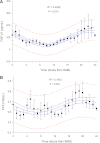Fibroblast growth factor 21 levels in young healthy females display day and night variations and are increased in response to short-term energy deprivation through a leptin-independent pathway
- PMID: 23193213
- PMCID: PMC3609498
- DOI: 10.2337/dc12-0497
Fibroblast growth factor 21 levels in young healthy females display day and night variations and are increased in response to short-term energy deprivation through a leptin-independent pathway
Abstract
Objective: Fibroblast growth factor (FGF)-21 is an endocrine factor with potent metabolic effects. Its day-night patterns of secretion and/or its physiological response to energy deprivation and relationship to free fatty acids (FFAs) and/or leptin remain to be fully elucidated. We aim to elucidate day-night pattern of FGF-21 levels and its relationship to FFA, to assess whether energy deprivation alters its circulating patterns, and to examine whether leptin may mediate these changes.
Research design and methods: Six healthy lean females were studied for 72 h in a cross-over interventional study under three different conditions: on isocaloric diet and in a fasting state with administration of either placebo or metreleptin in physiological replacement doses. Blood samples were obtained hourly from 8:00 a.m. on day 4 until 8:00 a.m. on day 5.
Results: FGF-21 exhibited day-night variation pattern during the isocaloric fed state. Fasting significantly increased FGF-21 levels (P < 0.01) via a leptin-independent pathway. Day-night variation pattern in the fed state was lost on fasting. Leptin replacement in the hypoleptinemic state restored approximate entropy of FGF-21 time series but did not alter circulating levels. FGF-21 levels were closely cross-correlated with FFA levels in all three states.
Conclusions: A day-night variation in the levels of FGF-21 exists in young lean females in the fed state. Energy deprivation increases FGF-21 levels via a leptin-independent pathway. The interaction between FGF-21 and starvation-induced lipolysis, as indicated by its close cross-correlations with FFA in both fed state and energy deprivation, needs to be studied further.
Trial registration: ClinicalTrials.gov NCT00140231.
Figures



References
-
- Nishimura T, Nakatake Y, Konishi M, Itoh N. Identification of a novel FGF, FGF-21, preferentially expressed in the liver. Biochim Biophys Acta 2000;1492:203–206 - PubMed
-
- Hart AW, Baeza N, Apelqvist A, Edlund H. Attenuation of FGF signalling in mouse beta-cells leads to diabetes. Nature 2000;408:864–868 - PubMed
-
- Zhang X, Yeung DC, Karpisek M, et al. Serum FGF21 levels are increased in obesity and are independently associated with the metabolic syndrome in humans. Diabetes 2008;57:1246–1253 - PubMed
Publication types
MeSH terms
Substances
Associated data
Grants and funding
LinkOut - more resources
Full Text Sources
Medical

